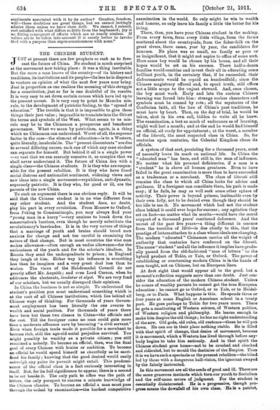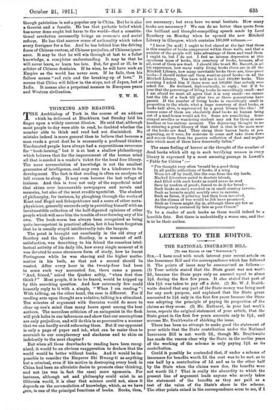THE CHINESE STUDENT.
JUST at present there are few prophets so rash as to fore- cast the future of China. No student is much surprised at the movement now taking place : it was a thing inevitable. But the more a man knows of the country—of its history and traditions, its institutions and its people—the less he is disposed to venture an opinion of what the next few years may bring. Just in proportion as one realizes the meaning of this struggle for a constitution, just so far is one doubtful of its results. It is very easy to set down certain causes which have led up to the present unrest. It is very easy to point to Manchu mis- rule, to the development of patriotic feeling, to the " spread of education." The trouble is that it is impossible to give these things their just value ; impossible to translate into the Orient the terms and symbols of the West. What seems to us mis- rule may be to the Chinaman a prosperous and beneficent governance. What we mean by patriotism, again, is a thing which no Chinaman can understand. Worst of all, the supreme factor in the case—the element of education—is to a Western, quite literally, incalculable. The " present discontents " are due to several differing causes, each one of which any sane student can separate for himself. But behind it all is a single power —so vast that we can scarcely conceive it, so complex that we shall never understand it. The future of China lies with a single class—the Chinese students. It is they who are respon- sible for the present rebellion. It is they who have fused social distress and nationalist sentiment, widening views and new ideas into a single movement—republican, anti-dynastic, supremely patriotic. It is they who, for good or ill, are the parents of the new China.
To such an argument there is one obvious reply. It will be said that the Chinese student is in no wise different from any other students And the student does, no doubt, play his part in every revolution. From Moscow to Oxford, from Peking to Constantinople, you may always find your "young man in a hurry "—very anxious to break down the conservative's barriers, even though he merely substitute the revolutionary's barricades. It is in the very nature of things that a marriage of youth and brains should breed men anxious for change and not too careful in examining the nature of that change. But in most countries the wise man makes allowance—often enough an undue allowance—for the enthusiasm of the youth and for the scholar's idealism. In Russia they send the undergraduate to prison ; in England they laugh at him. Either way his influence is something less than he imagines and a very great deal less than he wishes. The views of the Hebdomadal Council do not greatly affect Mr. Asquith ; and even Lord Curzon, when be addresses the electorate, laudatur et alget. We are very fond of our scholars, but we usually disregard their opinions.
In China the business is not so simple. To understand the student's position you must understand something which is at the root of all Chinese institutions, which lies behind all Chinese ways of thinking. For thousands of years Govern- ment employment has been literally the one avenue to wealth and social position. For thousands of years there have been but these two classes in China—the officials and the rest. Till the foreigner came no man could gain more than a moderate affluence save by becoming " a civil servant." Even when foreign trade made it possible for a merchant to become rich, still the age-old social prejudice survived. You might possibly be wealthy as a. private citizen ; you still relliktined a nobody. To become an official, then, was the final goal of every Chinese with brains or ambition. To become an official he would spend himself as cheerfully as be sacri- ficed his family ; knowing that the good desired would easily outweigh any pains its pursuit might entail. This predomi- nance of the official class is a fact curiously interesting in itself. But, for its full significance to appear, there is a second to be set beside it. The only path to office was the path of letters, the only passport to success a minute knowledge of the Chinese classics. To become an official a man must pass through the ordeal by examination—the hardest competitive
examination in the world. So only might he win to wealth and honour, so only leave his family a little the better for his living.
There, then, you have your Chinese student in the making. From every town, from every little village, from the farms scattered about the countryside, from the fisher-folk on the
great rivers, there came, year by year, the candidates for honours. No place was so small, no family so poor or
so insignificant, that it might not aspire to office of some sort.
Here some boy would be chosen by his house, and all their hopes would be set on his success. There half-a-dozen families would combine and invest their all in educating some brilliant youth, in the certainty that, if he succeeded, their disbursements would be repaid an hundredfold; since the
Chinese magistracy offered and, to speak truth, still offers not a little scope to the unjust steward. And, once chosen, the boy must work. Early and late the curious Chinese learning was forced into him : strange useless characters and symbols must be conned by rote ; all the mysteries of the Confucian faith, all the lore of China's past traditions, he must have by heart. Then, on the day of trial, he would be taken, shut in his own cell, bidden to write all he knew. The examination, a test as much of endurance as of learning, might well last a month; and at the end he would find himself an official, all ready for appointment ; at the worst, a member of the literati, the most respected class in China. So, for centuries upon centuries, the Celestial Kingdom chose its officials.
A system of that sort, persisting for a thousand years, must of necessity leave its mark on national life. In China the " educated man " has been, and still is, the man of influence. No matter what his personal deficiencies, if a man is a " student" he is above all human greatness. Even to have failed in the great examination is more than to have succeeded as a tradesman or a merchant. The class of literati still remains the class to which all China, looks for advice and guidance. If a foreigner can conciliate them, his path is made easy; if he fails, he may as well seek some other sphere of activity. Their power is beyond princes, inalienable even by their own folly, not to be denied even though they should be too idle to use it. No movement which had not the student class behind it could ever hope for success ; any agitation they set on foot—no matter what its merits—would have the moral support of a thousand years' continued deference. And the unrest of the past five years—a thing different in essence from the troubles of 1900—is due chiefly to this, that the prestige of letters attaches to a ()lass whose ideals are changing. The modern " educated " Chinaman carries all the weight of authority that centuries have conferred on the literati. The name" student" and all the influence it implies have gradu- ally passed from the old-fashioned "man of letters " to the hybrid product of Tokio, or Yale, or Oxford. The power of establishing or overturning modern China is in the hands of men taught, not on Chinese, but on European lines.
At first sight that would appear all to the good, but a moment's reflection suggests more than one doubt. Just con- sider the education of the modern Chinese student. Unless he comes of wealthy parents he cannot get the true European education : he cannot go to Oxford, or to Yale, or to Heidel- berg, or to Paris. What happens is this. He spends three or four years at some English or American school in a treaty port. He goes perhaps to Tokio for two years more. There he gets a smattering of Western science, of Western politics, of Western religion and philosophy. He learns enough to make him despise the old things ; he has no right understanding of the new. Old gods, old rules, old customs—these he will put down. He can see in their place nothing stable. He is filled with that spirit of change, that desire of movement, because it is movement, which a Western has lived through before any- body begins to take him seriously. And in that spirit the Chinese student goes home—not to be crushed and checked and ridiculed, but to mould the destinies of the Empire. Thus it is we have such a spectacle as the present rebellion—the blind led by those with a dangerous half-vision, the ignorant swayed by the falsely instructed.
In this movement are all the seeds of good and ill. There are the same generous instincts which turn our youth to Socialism and the self-same errors of judgment. For the student is essentially disinterested. He is a progressive, though pro- gress means the downfall of his own class. Hs-it a patriot, though patriotism is not a popular cry in China. But he is also a theorist and a fanatic. He has that pathetic belief which has never done aught but harm to the world—that a constitu- tional revolution necessarily brings an economic and social reform. He has that narrow sense of nationality which takes every foreigner for a foe. And he has behind him the driving force of Chinese custom, of Chinese prejudice, of Chinese ignor- ance. It may be that he will win through at last to a fuller knowledge, a completer understanding. It may be that he will never learn, or learn too late. But, for good or ill, he is arbiter of Chinese destinies. If he wins, he will have such an Empire as the world has never seen. If he fails, then his failure means "red ruin and the breaking-up of laws." It means that China will follow in the steps, not of Japan, but of India. It means also a perpetual menace to European peace and Western civilization.
T. W. H.















































 Previous page
Previous page